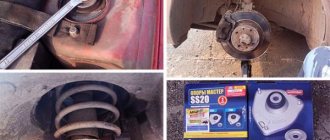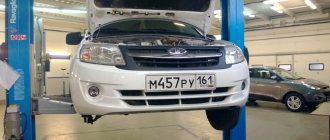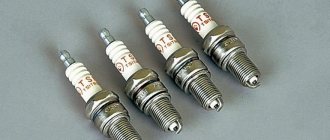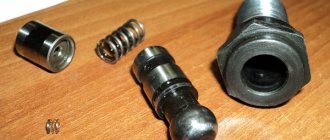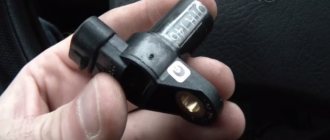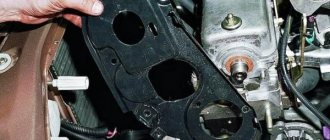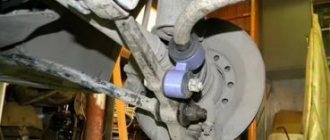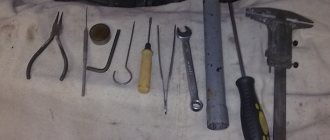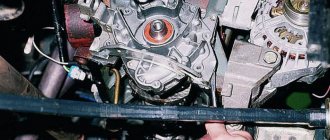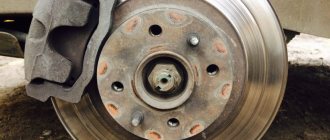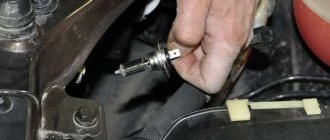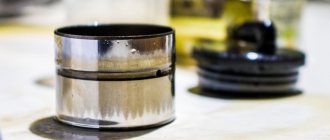What is the problem
A hydraulic compensator is an engine mechanism that regulates the operation of valves. This small part saves fuel, reduces engine sounds, extends the life of other parts, and increases engine power. The device is complexly designed; when dirt gets into the engine cylinder, it becomes clogged, and cheap, low-quality oil disables it.
The malfunction of hydraulic compensators can be determined by the following criteria:
- Engine knocking that does not decrease when the car warms up.
- Reduced power.
Replacement of this mechanism occurs, most often, when the car has a hundred-kilometer mileage. This condition guarantees wear of the part, which may be exceeded.
Causes of the problem:
- Use of low quality spare parts.
- Particles formed by abrasive devices getting into the hydraulic compensator.
- Clogging of channels when using low-quality oil or filter failure.
- Incorrect oil filling.
Replacing hydraulic compensators on a Lada Priora with your own hands: video instructions
It just so happens that the domestic auto industry has a special status among owners of wheeled vehicles. On the one hand, everyone never tires of scolding it for its poor build quality, on the other hand, there is no doubt about the maintainability and unpretentiousness of cars produced in Russia.
The Lada Priora, which replaced the VAZ-2110, immediately fell in love with many car owners, occupying a niche that is not very expensive in the price of the domestic sedan and hatchback. And something that is actively driven begins to break down, and Priora is no exception. One of the most common complaints from car enthusiasts is an extraneous knock in the engine, starting from 15-20 thousand kilometers.
general information
Hydraulic compensators (or hydraulic pushers) are devices that help eliminate gaps in the drive using oil pressure and at the same time transmitting camshaft force to the valves. This device also helps improve the dynamic characteristics of the car and reduce fuel consumption.
Hydraulic compensators consist of a housing, a check valve, a plunger spring and a plunger pair. The device has the shape of a cylinder and is located next to the camshaft and valves.
Diagram of operation of the hydraulic pusher in the valve mechanism of the VAZ-21126 engine: 1 – valve; 2 – check valve spring; 3 – check valve; 4 – cylinder head; 5 – camshaft cam; 6 – pusher; 7 – plunger; 8 – plunger spring; 9 – sleeve; 10 – check valve body; A, B – hydraulic pusher cavities; B – oil channel.
As you know, timing elements can heat up and expand due to exposure to heat, resulting in a change in the gaps between them. Adjusting the valve clearance with your own hands is a rather complex procedure, and therefore elements requiring adjustment (like levers and washers) have been replaced by hydraulic compensators that can automatically determine the clearance without any additional settings.
The approximate cost of this device most often varies from 1500 to 3500 rubles. (for example, a hydraulic pusher for a Lada Priora costs approximately 2200-2300 rubles).
Replacing hydraulic compensators on the 21126 Priora engine 16 valves
First of all, you need to buy new hydraulic compensators for the Priora engine. It is important to take into account that if one main valve fails, then everything should be changed. To carry out the work you will need the following tools.
Tool
- Set of wrenches with socket heads;
- Screwdrivers;
- New set of compensators;
- New cylinder head cover gasket;
- Camshaft seals;
- Sealant;
- Magnet (optional).
Procedure
- Disconnect the terminals from the car battery;
- Remove the engine casing;
If after all the actions the knock remains, then the reason probably lies not in the hydraulic compensators themselves, but in the cylinder head. In your Priora, the oil channels may be clogged, as a result of which the expansion joints do not receive the required amount of oil.
We also add that the average cost of work at a service station to replace hydraulic compensators on a Priora is about 4,000 rubles.
Source
Countersinking saddles
When repairing the cylinder head yourself, be prepared for the most monotonous and lengthy process - countersinking. A lot depends on its quality:
- tight fit of the valve to the seat;
- compression ratio in the combustion chamber.
The seat grinding work is carried out with a special tool - a roller cutter (less often - a countersink). With its help, a not quite finished seat can be given the desired shape so that the valve fits more tightly. Start work with a countersink at 60 degrees.
As soon as metal removal has begun in a circle, change the nozzle - take a countersink with a cone angle of 120 degrees. Work with it until a clear round edge appears. The final stage of countersinking is done with a 90-degree cone - it should go through the working chamfer of no more than 1.5 mm. Further grinding of the valve will increase it to the required value.
Checking hydraulic compensators
The verification process should begin with an inspection of the spring, after which the size of the gaps between the valves and guide bushings is measured. If necessary, the increased gaps are eliminated, after which:
- The crankshaft is turned so that the knocking valve opens slightly;
- Next, you should turn the spring a little, and the valve will turn along with it;
- After this, the engine is started, and if the knocking repeats, the first and second of the above-described manipulations are repeated again.
The incessant knocking of valves directly indicates a breakdown of the hydraulic compensator.
see also
Comments 46
no, there won’t be any of these on 8 valves, hydraulics. hydraulics on 8 current valves on Nivas
Nexia 1.5 8 valves with hydraulics! Lanos 1.5!
No, it doesn't exist. But you can do it yourself, hydraulic compensators are suitable for Volga 406 engines, the task is simple, raise the camshaft by 10 millimeters.
there are no such motors, and the west will have the same rattling weak motor
I saw the topic and decided to ask the experts. If the VAZ system with hydraulic compensators is not reliable. Something gets stuck there, etc. Is it possible to pick up hydraulic compensators from a foreign car, from the same Opel Cadet of 80+ years. Where are compensators located but they work effectively. And yes, I don’t know much about this. Explain it as it is))
with the slightest difference in the hydraulic compensators, it may be that the valves are clamped and the hydraulics are clicking, it will be as if a diesel engine is running, not a gasoline internal combustion engine, as a result there is no traction due to the compression of the valves, and the engine will not run smoothly, which means the heart may stop)
I saw the topic and decided to ask the experts. If the VAZ system with hydraulic compensators is not reliable. Something gets stuck there, etc. Is it possible to pick up hydraulic compensators from a foreign car, from the same Opel Cadet of 80+ years. Where are compensators located but they work effectively. And yes, I don’t know much about this. Explain it as it is))
Why is it not effective? Firstly, everything works great, and secondly, there are a great many manufacturers of spare parts.
But I don’t know why it’s not effective. I didn't have such a car)). I just hear this from everyone. This is how we formed our opinion. If normal actually works, then so much the better))
No, and it’s practically impossible to install, it won’t fit from a VAG, at the factory level it’s easier for them to install a motor from Renault or a 16kl AUTORskiy than to remake the entire head
But for me, hydraulics are a minus... it’s easier to adjust the gap than to deal with hanging hydraulics. Especially if OURS do it...
Unfortunately, the reality is that VAZ hydraulic compensators work better than INA. I was convinced of this from personal experience.
source
Oil, antifreeze, brake and other fluids Lada Vesta
Products from the Dustershop77 range on the topic of the article:
| Name | Manufacturer | Price | Availability | Add to cart |
| 110265505R | Oil drain plug gasket (1.6 K4M, 2.0 F4R, diesel K9K) original 110265505R | Original | 250 / 200 rub. Discount: 150 rub. | >10 |
| DC448 | Antifreeze liquid 5l. (anti-freeze washer) winter -25C | 250 / 200 rub. Discount: 150 rub. | >10 | |
| DC353-7711428132 | Antifreeze Glaceol RX Type D 1l. Renault Original 7711428132 | Original | 1200 / 999 rub. Discount: 800 rub. | 7 |
| DC466-32149 | Oil drain plug gasket (1.6 K4M, 2.0 F4R, diesel K9K) ASAM 32149 analogue 110265505R | Analogue | 100 / 80 rub. Discount: 50 rub. | >10 |
| DC921-7700500168 | Spark plug two-pin (engine 1.6, 2.0) Renault 7700500168 / 7700103533 / 224013682R / 7700115827 | Original | 500 / 400 rub. Discount: 300 rub. | 6 |
| DC358-5w30-5L-D | Engine oil 5W30 Evolution Full-tech FE 5l. for diesel engines | Original | 5000 / 4500 rub. Discount: 3900 rub. | 2 |
| DC355-75w80-1L | Transmission oil ELF TRANSELF NFJ 75W80 1l. for manual transmission | Original | 1500 / 1100 rub. Discount: 950 rub. | 6 |
| DC356-5w30-1L | Motor oil ELF 5W30 Evolution 900SXR 1l. synthetic | Original | 1500 / 1000 rub. Discount: 800 rub. | 5 |
| DC352-7711575504 | Brake fluid DOT4 volume 0.5 l. Original Renault 7711575504 | Original | 1000 / 800 rub. Discount: 700 rub. | 5 |
| DC366-224011561r | Spark plug for H4M/HR16DE 1.6 114 HP engine. gasoline 224011561r original | Original | 1200 / 700 rub. Discount: 500 rub. | 8 |
| DC365-152085758r | Oil filter for engine H4M/HR16DE 1.6 114 hp. gasoline original | Original | 1000 / 700 rub. Discount: 600 rub. | 4 |
| DC369-V144-165460509R | Air filter for engine H4M/HR16DE 1.6 114 hp. gasoline 165460509R original | Original | 1300 / 1100 rub. Discount: 900 rub. | 6 |
| DC354-459460A | Automatic transmission/power steering oil ELF RENAULTMATIC D2 1l. | Original | 1500 / 1200 rub. Discount: 1000 rub. | 7 |
| DC1015 | Engine oil ELF Evolution SXR 5w40 (4 liters) | Original | 3000 / 2900 rub. Discount: 2600 rub. | 2 |
| DC362-PFB401 | Brake fluid DOT 4 TRW (1 liter) | Analogue | 1000 / 600 rub. Discount: 500 rub. | 6 |
| DC513 | Distilled water 1l | 150 / 100 rub. Discount: 80 rub. | 5 | |
| DC393 | Drive belt 1.6 H4M/HR16DE (WITH COND.) (DAYCO analogue 117203168R) | Analogue | 1500 / 1000 rub. Discount: 800 rub. | 2 |
| DC1565 | Engine oil Renault-Castrol GTX RN-SPEC 5w30 RN720 5l (replacement for ELF FULL-TECH FE) for diesel engines | Original | 4000 / 3500 rub. Discount: 3200 rub. | 1 |
| DC613-194734 | ELFMatic G3 for power steering 1 l | Original | 1500 / 500 rub. Discount: 400 rub. | 9 |
| DC514 | Distilled water 3l | 350 / 250 rub. Discount: 200 rub. | 3 | |
| DC1544-5w30-4L | Motor oil ELF 5W30 Evolution 900SXR synthetic (4 l.) | Original | 2800 / 2500 rub. Discount: 2200 rub. | >10 |
| DC417-6PK1200 | Alternator belt 1.6 petrol H4M/HR16DE without air conditioning. DAYCO 6PK1200 (117208408R) | Analogue | 9000 / 600 rub. Discount: 500 rub. | 1 |
| DC1598 | CoolStream NRC antifreeze ready (yellow) RENAULT/NISSAN/VAZ 1l. | 1000 / 700 rub. Discount: 400 rub. | 2 | |
| V101-NF6433C | Cabin filter Lada Vesta / X Rey Nevsky Filter NF6433C (carbon) | Analogue | 300 / 250 rub. Discount: 250 rub. | 2 |
| V155-21080101106200 | Original oil drain plug gasket (VAZ-21129/21179) | Original | 20 / 15 rub. Discount: 10 rub. | >10 |
| DC1148 | Anti Rain LAVR, with dirt-repellent effect, 185 ml | 500 / 350 rub. Discount: 250 rub. | 2 | |
| DC1563 | Engine oil Renault-Castrol GTX RN-SPEC 5w30 RN700 5l (replacement for ELF SXR) | Original | 2600 / 2300 rub. Discount: 2100 rub. | 2 |
| DC1348 | Anti-gravel transparent Hi-Gear 311g. | Original | 1200 / 1100 rub. Discount: 1000 rub. | 3 |
| DC1146 | Grease WD-40 200ml with tube | Original | 450 / 350 rub. Discount: 250 rub. | 1 |
| DC359-10w40-5L | Engine oil ELF 10W40 Evolution 700STI 5l. semi-synthetic | Original | 1900 Discount: 1900 rub. | 1 |
| DC1133 | Grease WD-40 420ml with tube | Original | 700 / 550 rub. Discount: 500 rub. | 2 |
| DC1175-411040092 | Lubricant Litol-24 100g | 400 / 150 rub. Discount: 100 rub. | 2 | |
| DC1318-614500 | Antifreeze Sintec G12 red 5l. | Analogue | 1200 / 1000 rub. Discount: 800 rub. | 3 |
| V151-911736 | Air filter TSN (VAZ-21129/21179) | Analogue | 350 / 250 rub. Discount: 200 rub. | 1 |
| DC1124 | MOTRIO ultra 5W-40 oil, 5 liters | Original | 2300 / 2000 rub. Discount: 1800 rub. | 1 |
| DC1317-613500 | Antifreeze Sintec G12 red 1l. | Analogue | 500 / 350 rub. Discount: 250 rub. | 1 |
| DC1599 | CoolStream NRC antifreeze ready (yellow) RENAULT/NISSAN/VAZ 5l. | 2000 / 1500 rub. Discount: 1200 rub. | 1 | |
| DC1569 | Automatic transmission/power steering oil Transmax Dex III Multivehicle 1l (replacement for ELF RENAULTMATIC D2-D3) | Original | 1000 / 800 rub. Discount: 600 rub. | 8 |
| DC1579 | Engine oil SINTEC 5w30 4l (synthetic approval Renault RN700) | Original | 1500 / 1400 rub. Discount: 1100 rub. | 3 |
| V156-21120101106100 | Original oil drain plug (VAZ-21129/21179) | Original | 200 / 100 rub. Discount: 50 rub. | >10 |
| DC1123 | Oil MOTRIO ultra 5W-30, 5 liters | Original | 2500 / 2000 rub. Discount: 1800 rub. | 2 |
| DC1142 | Lock defroster Hi-Gear 75ml | 400 / 300 rub. Discount: 200 rub. | 1 | |
| DC1150 | WD-40 lubricant 100ml with tube | Original | 350 / 300 rub. Discount: 250 rub. | 2 |
| DC1562 | Engine oil Renault-Castrol GTX RN-SPEC 5w40 RN710 1l (replacement for ELF SXR) | Original | 1100 / 800 rub. Discount: 600 rub. | 9 |
| DC1129 | Lock defroster LAVR 75ml | 400 / 300 rub. Discount: 200 rub. | 2 | |
| V157 | Engine oil LADA ULTRA 5W-40 synthetic original 1l. | Original | 800 / 700 rub. Discount: 600 rub. | 1 |
| V159 | Engine oil LADA ULTRA 5W-40 synthetic original 4l. | Original | 1900 / 1700 rub. Discount: 1500 rub. | 1 |
| DC1605-EA711 | Air filter for engine H4M/HR16DE 1.6 114 hp. gasoline analogue 165460509R | Analogue | 800 / 600 rub. Discount: 400 rub. | 4 |
| V143-21080101200582 | Oil filter Lada Vesta original 21080101200582 (VAZ-21129/21179) | Original | 500 / 300 rub. Discount: 250 rub. | 2 |
| V144-165460509R | Air filter original 165460509R (VAZ-21129/21179) | Original | 1300 / 1100 rub. Discount: 900 rub. | 2 |
| V145-8450006996 | Generator belt roller assembly original 8450006996 (VAZ-21129/21179) | Original | 2200 / 2100 rub. Discount: 1900 rub. | 1 |
| V147-21110370701086 | Spark plugs (4 pieces included) original A17DVRM (VAZ-21129/21179) | Original | 600 / 400 rub. Discount: 400 rub. | 4 |
| V153-FO014 | Oil filter FORTECH (VAZ-21129/21179) | Analogue | 350 / 250 rub. Discount: 250 rub. | 2 |
| DC1557-8450033130 | Air filter original 8450033130 (Vesta new model) | Analogue | 1200 / 1000 rub. Discount: 800 rub. | 4 |
| V158 | Motor oil LADA PROFESSIONAL 5W-40 semi-synthetic original 1l. | Original | 600 / 500 rub. Discount: 500 rub. | 1 |
| DC1567-75W80 | Transmission oil Castrol Syntrans V FE 75w-80 1l. for manual transmission (replacement for ELF TRANSELF NFJ 75W80) | Original | 1500 / 1200 rub. Discount: 1000 rub. | 3 |
| DC1564 | Engine oil Renault-Castrol GTX RN-SPEC 5w30 RN700 1l (replacement for ELF SXR) | Original | 1100 / 900 rub. Discount: 700 rub. | 1 |
| DC1566 | Engine oil Renault-Castrol GTX RN-SPEC 5w30 RN720 1l (replacement for ELF FULL-TECH FE) for diesel engines | Original | 1200 / 1000 rub. Discount: 800 rub. | 1 |
| DC1580 | Engine oil SINTEC 5w30 1l (synthetic approval Renault RN700) | Original | 900 / 700 rub. Discount: 550 rub. | 2 |
| V142-8450006328 | Auxiliary drive belt (generator) VAZ-21129/21179 | Original | 1500 / 1300 rub. Discount: 1300 rub. | 1 |
| V146-272773151R | Cabin filter original 272773151R | Original | 1100 / 800 rub. Discount: 800 rub. | 1 |
| V148-21126100604086 | Original timing belt kit (VAZ-21129/21179) | Original | 4300 / 4200 rub. Discount: 4200 rub. | 1 |
| V150-K20TT | Spark plug DENSO 1pc. (VAZ-21129/21179) | Analogue | 250 / 200 rub. Discount: 200 rub. | 4 |
| V152-97888 | Cabin filter TSN (VAZ-21129/21179) | Analogue | 350 / 250 rub. Discount: 250 rub. | 1 |
| V153-CT1137K1 | Timing belt kit CONTITECH (VAZ-21129/21179) | Analogue | 3400 / 3100 rub. Discount: 3100 rub. | 1 |
| DC1811-226755893R | Fuel filter 226755893r original Renault/Lada vibration damper | Original | 1100 / 700 rub. Discount: 500 rub. | 1 |
| DC1877 | Pallet plug Vesta, X-Ray, 2101-2115 22mm | Analogue | 70 / 50 rub. Discount: 30 rub. | 3 |
| DC053 | Engine oil ELF Evolution SXR 5w40 (5 liters) | Original | 4000 / 3500 rub. Discount: 3300 rub. | 0 |
| DC692-5W40-1L | Motor oil ELF 5W40 EVOLUTION 900SXR 1L. synthetic | Original | 1500 / 900 rub. Discount: 800 rub. | 0 |
| DC1561 | Engine oil Renault-Castrol GTX RN-SPEC 5w40 RN710 5l (replacement for ELF SXR) | Original | 2500 / 2200 rub. Discount: 2000 rub. | 0 |
| DC357-5w30-5L | Motor oil ELF 5W30 Evolution 900SXR 5l. synthetic | Original | 4500 / 3800 rub. Discount: 3200 rub. | 0 |
Causes of knocking hydraulic compensators
The appearance of extraneous noise during engine operation can be caused by violation of the timing gaps. Most car owners in this case try to adjust the valves, however, this procedure does not always help. Very often the cause of knocking is a worn hydraulic compensator. It should also be remembered that any unprofessional interventions can worsen the current situation.
As a rule, the occurrence of extraneous knocking is not a sudden phenomenon; it is characterized by a gradual and increasing development. Therefore, if you notice the knocking of hydraulic compensators on your car, you should not give in to panic - for a certain time the car will function quite properly, but you should not delay the repair.
Possible reasons for knocking hydraulic compensators on Lada cars are:
- Engine knocking that occurs when it starts. If extraneous noise disappears just a few moments after starting the power unit, there is no reason to worry - everything is fine.
- Extraneous noise from the hydraulic compensator is observed both on a warm and cold engine, but disappears when the speed increases. In this case, the check valve ball is worn out, and therefore the hydraulic pusher will need to be replaced. In addition, the knocking can be caused by a clogged hydraulic compensator mechanism, then cleaning its elements will help get rid of the noise.
- The knocking noise is only noticeable when the engine is warm. Such a knock indicates an increase in the gaps between the hydraulic pusher sleeve and the plunger; to fix the problem, the hydraulic compensator will need to be replaced.
- A knocking sound in the engine is observed at high speeds. In this case, the cause of the problem may be an excessive amount of engine oil, or, conversely, a lack of oil. The knocking noise is eliminated when the engine oil level is brought to normal. In addition, such a knock may indicate damage to the oil receiver, which in this situation will have to be replaced.
- There is a constant knocking sound from the valves. The reason for this is most often the gap between the camshaft cam and the pusher. You can get rid of extraneous noise and knocking by cleaning or by replacing faulty parts with new ones.
Also, knocking may occur if there is carbon deposits in the system; in such a situation, removing and washing the contaminated elements will help.
But the most important link in ensuring the full operation of the hydraulic compensator is the oil, and therefore its quality and timely replacement are of great importance. It is recommended to change the lubricant either strictly on time, or even a little earlier than this, which will maximize the life of the valve mechanism. Another reason for premature timing wear is an aggressive driving style, which entails a significant increase in loads on all vehicle systems.
When do you need to replace hydraulic compensators on a Priora?
How to determine that the hydraulic compensators on a Priora need to be replaced?
A clear sign that one of the 16 hydraulic compensators has failed is the presence of a knocking sound in the engine. This knocking noise may appear on a cold start and disappear when the unit is warm. If the engine is knocking, then it is certainly better to have it rebuilt and checked to understand why there is an alien sound coming from the engine. But the reason why hydraulic compensators knock on a cold engine may also be that they simply do not contain oil. After a couple of minutes, the knocking of the hydraulic compensators usually disappears and does not recur until the next cold start.
When compensators knock on a hot engine, replacing them can no longer be avoided. Whatever the stated service life of these consumables, they have already expired. If the hydraulic compensators knock on a warm or cold engine, but only when the speed increases, it means that there is a lot of oil in the engine or the oil filled is too thin for such a unit. The solution to this problem is to bleed off the excess amount of lubricant or fill in the recommended brand of oil. After this procedure, the extra sounds on the Priora will disappear.
If there is a sound similar to the knock of a single hydraulic pusher, the cause may be contaminated hydraulic compensators on the Priora. When flushing, an oil change is inevitable. The procedure for assembling and disassembling the engine is similar to the replacement operation when the hydraulic compensators knock.
Pros and cons of a hydraulic compensator
There are many positive aspects to this mechanism:
- It is completely maintenance-free and works automatically
- Increased timing system resource
- Maximum pressure, which gives good traction
- Minimum fuel consumption
- The engine always runs quietly
Well, despite all the advanced design, there are also a fairly large number of disadvantages.
- Since all work is based on oil pressure, you need to fill in only high-quality lubricants. Synthetic is desirable
- Need to change oil more often
- The design is more complex
- Expensive repairs
- Over time, they can become clogged, which impairs engine performance (consumption and traction), and the timing belt begins to make noise.
The biggest disadvantages are that the design is expensive and complex, and is VERY demanding on the quality of the oil. If you pour “don’t understand what” they will very quickly fail and require replacement. For example, conventional mechanical pushers are much simpler and less demanding on the quality of lubrication.
Malfunctions and their causes
As mentioned above, the design of hydraulic compensators is extremely simple. But even such simple parts fail. There are three main signs that indicate that something is wrong with the hydraulic compensators:
- While the engine is running, a quick knocking noise is clearly audible.
- Engine power drops significantly, especially at high speeds.
- The engine runs rough, even at idle.
If any of these signs are observed, then it’s time to change the hydraulic compensators. The main problem with these parts is that they are extremely sensitive to the quality of the engine oil. Sometimes it doesn’t even get to the point of replacing hydraulic compensators. The car owner simply drains the old oil, fills in new oil (after flushing the engine) and the knocking disappears. If the problem does not go away, it means that there is mechanical wear of the hydraulic compensators (usually this occurs due to the so-called metal fatigue).
Review of manufacturer prices and the cost of hydraulic compensators for the Lada Granta
| Name / catalog article | Price, rub.) |
| Original 2191-1007300 | From 2600 / set 10 pieces |
| RUVILLE 267200 | From 230/unit |
| RUVILLE 267687 | —/— |
| INA 420 0073 10 | —/— |
| INA 420 0127 10 | —/— |
| JSC "Prosport" 845412 | From 250/unit |
| JSC "Prosport" 845931 | —/— |
*prices are current as of October 22, 2018.
Technical data of pushers:
- Weight: 1.150 kg;
- Size: 210 x 175 x 90 mm.
Reviews
| № | Positive |
| 1. | Victor: the valve mechanism works properly, there are no complaints. At 55,000 km the valve began to knock, so I contacted the workshop. It turned out that the fastening nut had become loose. |
| 2. | Vasily: I don’t know of any problems with the engine and its mechanisms, I regularly carry out technical inspections and fill in high-quality oil. |
| 3. | Sergey: at 65,000 km I replaced two pushers, the service life is good. The remaining hydraulic compensators are normal, the master said they were in good working order. |
| 4. | Vladlen: I’ve heard a number of negative reviews about the quality of the pushers, I can’t confirm, the machine works like a watch. I believe that careful handling of equipment and high-octane fuel are the key to long-term operation. |
| 5. | Vladimir: at 70,000 km I replaced a set of pushers. I think that the resource is more than sufficient. I carried out the work myself, the replacement procedure is not complicated. |
| Negative | |
| 1. | Slavik: my pushers went off at 35,000 km. The reason is the quality of workmanship and the fineness of adjustment. It is obvious that the technology is broken. Under warranty, they replaced a set of new ones. |
| 2. | Gennady: after 40,000 km, I replaced the set of pushers. Initially they knocked on “cold”, then constantly. The workshop said that there was a manufacturing defect. |
| 3. | Ivan: replaced two pushers in a year. What kind of workmanship can we talk about? I leave my negative review. |
Why do hydraulic compensators knock when cold?
If extraneous sounds occur when the power unit is running cold, and disappear after it warms up, then the cause should be sought precisely in the condition of the oil system and the quality of the working fluid. In this case, the main reasons may be:
- The filter element is clogged, which prevents the oil from exerting the required pressure. As the temperature rises, the filter outlet expands and everything returns to normal - the noise disappears;
- Valve contamination. Again, an increase in temperature changes the viscosity of the working fluid, making it more liquid, which temporarily eliminates the problem and the system begins to work as it should.
Higher or lower oil levels can also cause this. In the first case, foaming of the liquid occurs, which disrupts the operation of the hydraulic compensators; in the second, the pump simply begins to pump air, which is also not good.
Naturally, the pumping equipment itself can be the main reason for this effect. If it does not function correctly, it will not create the required level of pressure in the system.
Consequences of the knocking sound
It is interesting that the breakdown of hydraulic compensators does not lead to any damage to other mechanisms of the power plant.
For knocking hydraulic compensators, the thermal clearance is simply disrupted, which only leads to a decrease in the power and throttle response of the power plant and an increase in fuel consumption.
But a knocking sound may indicate a malfunction in the lubrication system, so it is important to find out why they are knocking and fix the problem.
As for the use of SOHC and DOHC gas distribution systems on cars, the only difference is in the number of installed hydraulic compensators.
Thus, modern cars, including domestic ones, for example, VAZ 2112 and Lada Priora, already use a DOHC gas distribution system, with 4 valves per cylinder, and therefore with 4 hydraulic valves, the total number of which is 16.
The reasons for the knocking sound for all cars, including those mentioned, are the same.
The presence of such a number of hydraulic valves only makes it more difficult to identify a knocking hydraulic compensator if only one or several of the total number is knocking.
Causes of knocking valves in Lada Granta
- Increased camshaft cam clearance.
Note to the driver!
For each technical device, the manufacturer sets an individual gap. For example, for the Lada Granta Sedan / Liftback it is 0.25 mm inlet, 0.40 mm exhaust.
- A reduced gap is “contraindicated.” Clamping the valve body causes it to jam; it does not close the inlet port tightly. Long-term operation in this technical condition leads to a decrease in compression and failure of one/several cylinders.
It is important to know!
Periodic vehicle diagnostics every 10,000 km will prevent a number of breakdowns, including malfunction of the gas distribution mechanism.
